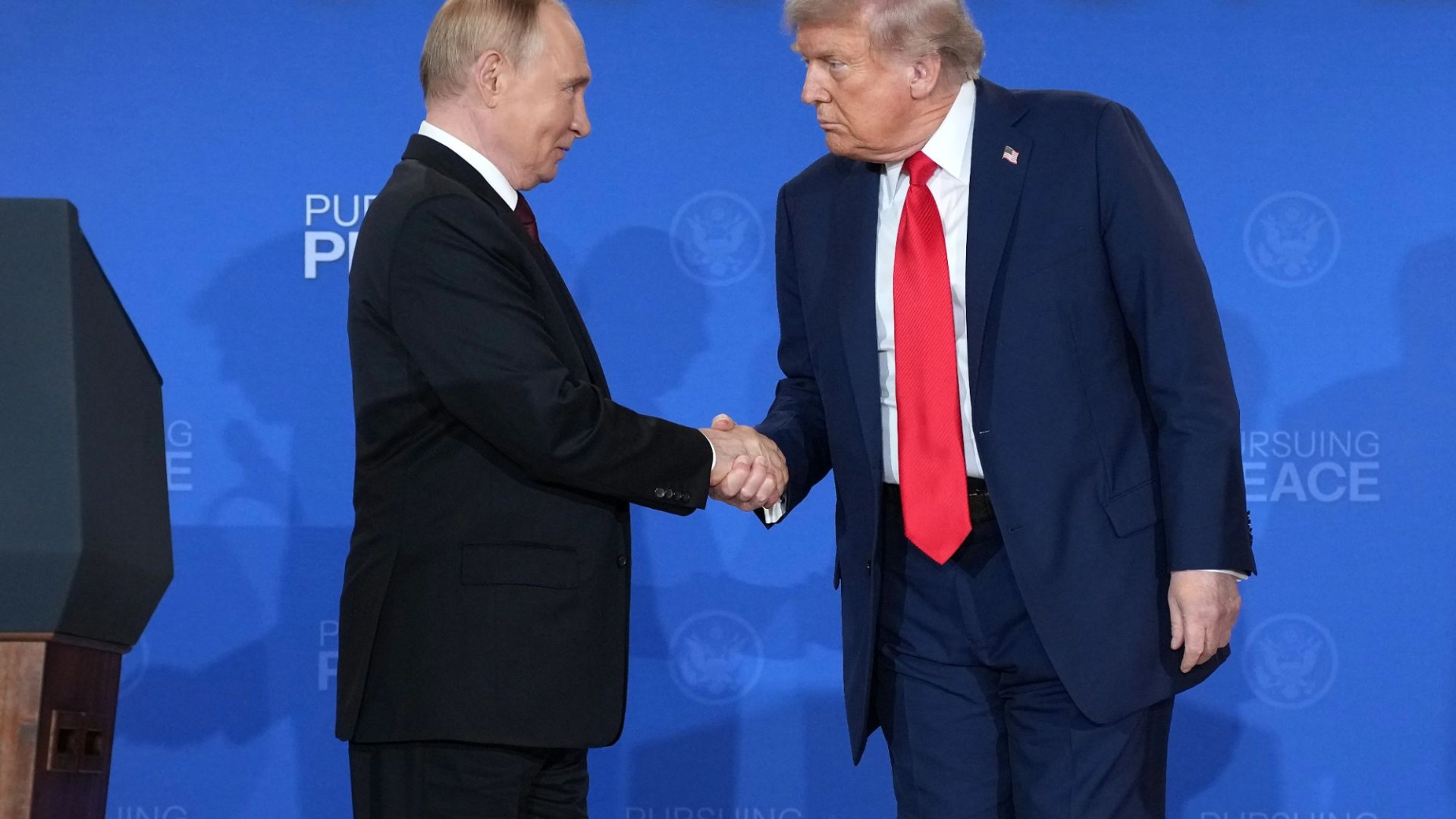World
Trump and Putin Negotiate Peace Terms that Challenge Ukraine’s Future

U.S. President Donald Trump and Russian President Vladimir Putin have reached a controversial agreement that could reshape the future of Ukraine. During discussions held on March 15, 2024, in Anchorage, Alaska, the two leaders proposed terms that would require Ukraine to surrender significant portions of its eastern territory, specifically the contested regions of Donetsk and Luhansk. The agreement would also effectively prohibit Ukraine from pursuing membership in NATO and the European Union.
This development comes as Ukraine’s aspirations to align more closely with Western alliances are increasingly jeopardized. The proposed peace terms include assurances from the U.S. and European allies to provide substantial security guarantees for Ukraine, aimed at deterring future aggression from Russia. However, these assurances fall short of the collective defense clause outlined in NATO’s Article 5, which commits member states to assist one another in the event of an attack.
Despite the precarious situation, Ukrainian President Volodymyr Zelensky remains adamant about securing the future safety of his nation. Following the summit, he expressed a commitment to peace but insisted that any agreement must include clear security provisions and respect Ukraine’s sovereignty. Zelensky has emphasized, “A real peace must be achieved, one that will be lasting, not just another pause between Russian invasions.”
International Reactions and Security Guarantees
The reaction from European leaders has been mixed, with many emphasizing the necessity for robust security measures. German Chancellor Friedrich Merz stated, “The good news is that America is ready to participate in such security guarantees and is not leaving it to the Europeans alone.” Meanwhile, British Prime Minister Sir Keir Starmer urged for unity among Western allies, commending Trump’s efforts to end the conflict while calling for continued pressure on Russia through sanctions.
The discussions in Alaska included a proposal for international forces to monitor a potential peace agreement, indicating a possible commitment from British and other European troops. Starmer remarked, “I welcome the openness of the United States, alongside Europe, to provide robust security guarantees to Ukraine as part of any deal.”
During the negotiations, it was confirmed that Russia would not have a veto over Ukraine’s aspirations to join the EU and NATO, although this does not preclude Zelensky from considering a withdrawal of Ukraine’s formal applications for membership as part of the broader peace deal.
Future Negotiations and the Path Ahead
As the situation evolves, Zelensky is scheduled to meet with Trump in Washington, D.C., where further discussions will take place regarding the terms of the proposed agreement. This meeting follows a contentious previous encounter in which Zelensky faced sharp criticism from Trump. The outcome of these talks remains uncertain, with both leaders under pressure to find a resolution that respects Ukraine’s territorial integrity while addressing the security concerns posed by Russia.
Zelensky’s administration has faced immense internal and external pressure to concede territory in order to end the ongoing conflict, which has resulted in over a million deaths and widespread suffering. Despite the challenging circumstances, Zelensky has maintained that any discussions regarding territorial adjustments must involve Ukrainian participation. He stated, “No issue, particularly territorial ones, can be decided without Ukraine.”
As negotiations continue, the international community remains vigilant. While some leaders have expressed support for Trump’s negotiations, others warn that failing to secure a ceasefire could lead to further escalation. Former Prime Minister Boris Johnson highlighted that the current economic strain on Russia may present an opportunity for a more favorable resolution.
In summary, the peace terms negotiated by Trump and Putin pose significant implications for Ukraine’s sovereignty and its aspirations for European integration. The coming days will be crucial as Zelensky navigates the complexities of diplomacy in a bid to secure his nation’s future.
-

 Entertainment2 months ago
Entertainment2 months agoIconic 90s TV Show House Hits Market for £1.1 Million
-

 Lifestyle4 months ago
Lifestyle4 months agoMilk Bank Urges Mothers to Donate for Premature Babies’ Health
-

 Sports3 months ago
Sports3 months agoAlessia Russo Signs Long-Term Deal with Arsenal Ahead of WSL Season
-

 Lifestyle4 months ago
Lifestyle4 months agoShoppers Flock to Discounted Neck Pillow on Amazon for Travel Comfort
-

 Politics4 months ago
Politics4 months agoMuseums Body Critiques EHRC Proposals on Gender Facilities
-

 Business4 months ago
Business4 months agoTrump Visits Europe: Business, Politics, or Leisure?
-

 Lifestyle4 months ago
Lifestyle4 months agoJapanese Teen Sorato Shimizu Breaks U18 100m Record in 10 Seconds
-

 Politics4 months ago
Politics4 months agoCouple Shares Inspiring Love Story Defying Height Stereotypes
-

 World4 months ago
World4 months agoAnglian Water Raises Concerns Over Proposed AI Data Centre
-

 Sports4 months ago
Sports4 months agoBournemouth Dominates Everton with 3-0 Victory in Premier League Summer Series
-

 World4 months ago
World4 months agoWreckage of Missing Russian Passenger Plane Discovered in Flames
-

 Lifestyle4 months ago
Lifestyle4 months agoShoppers Rave About Roman’s £42 Midi Dress, Calling It ‘Elegant’









